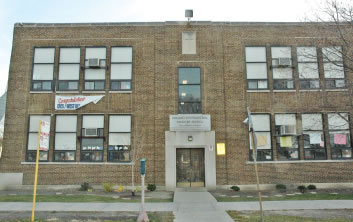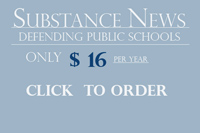6 Charter School Myths Busted in Chicago
One unfortunate result of the NCLB-Renaissance 2010 wars is that it has split the ranks of progressive school reformers and forced some — including some charter school operators — into alliances with big business and business-controlled political interests.
 While the Chicago newspapers were filled recently with page one stories about how a convicted sex offender had just served as an election judge at a Chicago elementary school, the December 2006 child porn guilty plea by Joseph Nurek was reported in the back pages. Nurek had served as principal of the Chicago International Charter School Belden Campus (above) until his 2004 arrest. In addition to the prison time he will receive for his child porn guilty plea, Nurke is still facing charges that he transported a minor across state lines for sex. Deregulated, charter schools do not screen their teachers and administrators as carefully as public schools are required to. (Substance photo by George N. Schmidt). Some of our best friends work in charter schools. Some PURE leaders send their children to charter schools. There’s a charter high school we often point to as a model of high quality assessment. However, what’s good for some can result in wrong for others, and the partial good does not outweigh that wrong. We must look at the whole picture.
While the Chicago newspapers were filled recently with page one stories about how a convicted sex offender had just served as an election judge at a Chicago elementary school, the December 2006 child porn guilty plea by Joseph Nurek was reported in the back pages. Nurek had served as principal of the Chicago International Charter School Belden Campus (above) until his 2004 arrest. In addition to the prison time he will receive for his child porn guilty plea, Nurke is still facing charges that he transported a minor across state lines for sex. Deregulated, charter schools do not screen their teachers and administrators as carefully as public schools are required to. (Substance photo by George N. Schmidt). Some of our best friends work in charter schools. Some PURE leaders send their children to charter schools. There’s a charter high school we often point to as a model of high quality assessment. However, what’s good for some can result in wrong for others, and the partial good does not outweigh that wrong. We must look at the whole picture.
Charter impact
Well-meaning people who run charter schools often react with hurtful surprise when charters are criticized. How could they be doing anything wrong? Here’s what Deborah Meier, the high priestess of small schools, had to say in a January 2007 post to the Small Schools Workshop e-mail list: “Of course we all believe we are doing what’s right for kids. But that doesn’t end the argument. We need also to remember that kids need a healthy society, so when we argue whether charters or vouchers or this or that is a good idea for society-at-large we are still talking about the interests of kids.... (Charters) can be used in ways that undermine the schooling of the least advantaged, as well as undermine the larger public mission of the common school.”
Endangering children
How are charters being used to undermine poor children’s education? Well, let’s start with a generalization. Children are endangered by lies and exaggerations about the effects of adult decisions.
A perfect example of this is the effect of retention on children. CPS and the Mayor continue to insist that flunking is good for them and better than the alternative despite the research-based fact that retention hurts and does not help children and the fact that there are better alternatives to retention than social promotion. CPS and the Mayor simply do not seem to have the will to do what it really takes to address the needs of at-risk children. The retention v. promotion argument is their cover, and it works for them. But children are endangered by policy making based on slick slogans or false choices. "...there is no research showing that choice is an effective reform strategy..."
In Chicago, charter schools are falsely held up as overwhelming successes in order to provide cover and an excuse for the city’s school closing, social engineering, gentrifying appetites. But children are endangered by policy making based on half-truths and exaggerations. Across the nation, charters are praised for offering “choice,” which some now seem to equate with Mom, apple pie and the flag. But there is no research showing that choice is an effective reform strategy, and children are endangered when policy makers pretend that it is.
Six charter school MYTHs busted
More specifically, there are many myths and lies about charter schools that are endangering children and need to be exposed. The mythbusting that follows is based a number of recently published articles.
MYTH #1: Freeing schools from bureaucracy benefits children
There is simply no evidence that freeing schools from bureaucracy has positive results for children. In the education setting, freedom from bureaucracy "...charters are allowed to push out 'undesirables', and to choose not to provide special education services..."allows charters to avoid day-to-day accountability. It allows charters to push out “undesirables” and choose not to provide services to special education, bilingual or other special needs students. Forcing parents to leave the school if they can’t resolve a problem is not accountability. Closing a school after five years is not adequate accountability.
In “Katrina’s Last Victims?” in the January 1, 2007 issue of The Nation, Lisa Delpit and Charles Payne ask, “In a decentralized system, who is responsible for the neediest students? The answer is likely to be no one.”
MYTH #2: Waiting lists are evidence of... well, something good, right?
Charter supporters often cite long waiting lists as evidence that the schools must be doing something right.
First of all, this is an unfair comparison with regular schools which cannot have waiting lists. Neighborhood schools either have to enroll you or find another school for you. Charters also have some methods of attracting students that have little to do with school quality. For example, the Wisconsin Career Academy is offering a $100 gift card to students who arrive with grade-point averages of at least a 3.5 grade point average, $50 to students with at least a 3.25, and school apparel to those with a 2.5 GPA or better. (Chicago Tribune, June 16, 2006).
MYTH #3: Competition and choice will force schools to improve
In an essay in the January 2007 issue of School Administrator, Robert Brower, an Indiana school superintendent, busts this myth quite eloquently: “Not only is the business model of reform misguided, there is not a shred of statistically significant research that supports the notion that competition will solve whatever ails K-12 education.” "There is not a shred of... research that supports the notion that competition will solve whatever ails K-12 education" - Robert Brower, Indiana School Superintendant
“As a public school educator for the last 33 years, I believe forcing business-like competition onto schools would lead to many undesired outcomes, while paying little attention to cooperative endeavors that could benefit students and school programs. For instance, the competitive business world does not encourage the sharing of successful strategies, but in education cooperation is a necessity. Rather than shaming schools into improving, we should be supporting low-achieving schools partnering with successful schools....Continuing to advocate a politically motivated, market-driven system of education will only delay the real work that needs to be done to help our public schools grow.”
Myth #4: Parents really want choice
In the 2006 Phi Delta Kappa/ Gallup poll of the public’s opinions about public schools, 71% preferred improving schools by reforming the existing system, up from 69% in 2002.
By contrast, just 24% of respondents preferred seeking an alternative system. 80% of parents would prefer that their local school be improved rather than transfer their children to another school. This confirms PURE’s belief that what parents really want is a high-quality neighborhood school, not choice.
In fact, parents really want our children close by where we can get to them quickly if we need to. We like having the school as a focus of our community.
Only 19% of parents support pro-voucher candidates; only 22% support pro-testing candidates.In 2006, when Public Agenda asked parents which school board election platform would most appeal to them, 45% chose the candidate whose main agenda was more funding and smaller class size. Only 22% liked the candidate who stood for more testing and standards, only 19% the voucher candidate, and only 9% the one who was promoting more charter schools.
MYTH #5: But OUR charters work miracles
Charter promotional publicity tends to be anecdotal: “But our charters are successful (unlike those charters whose poor performance makes us all look bad) — and look how cute and diverse our kids are!” Politicians from President Bush to Arne Duncan refuse even to acknowledge the consistent re- search showing that charters are only just as or a little less successful than regular public schools when demographics are factored in.
In fact, they tend to factor the demographics out. Last December, U.S. Secretary of Education Margaret Spellings wrote an essay in the San Francisco Chronicle praising NCLB and using some tricky data to claim that NCLB-inspired charter schools close the achievement gap.
Spellings’ wrote about Oakland, CA’s American Indian Public Charter School: “More than half of the student body demonstrates limited proficiency in English, while 83 percent qualify for free lunch. In 2004-05, 70 percent of sixth-graders scored proficient or better in the English- Language Arts portion of the California Standards Test, up from 36 percent two years earlier.”
Problem is, American Indian Charter School also replaced most of the American Indian students and some African-American and Latino students with Asian students who tend to score better on standardized tests despite low income and English Language Learner status.
MYTH #6: KIPP Works
Some major media folks promote the Knowledge is Power Program (KIPP) schools as models of successful privatization.
However, most people are unaware of at least one aspect of KIPP schools — the discipline system — because the media rarely talks about it. KIPP uses a punishment system based on shunning. A blogger reported students wearing “Miscreant” signs around their necks in one KIPP school. There are strict uniform rules and requirements that students walk in the hall in a silent line. Each classroom has a volume meter, which teachers use to inform students which voice level is appropriate for various activities. The discipline system of much-publicized KIPP schools is based around shunning.
Chicago’s KIPP elementary school closed down in part because parents were offended by the way the school treated their children and pulled them out. The enrollment dropped too low to maintain the school.
Final mythbuster: Uncle Sam!
The federal government reports that fourth-graders in traditional public schools are doing better in both reading and math than students in charter schools.
The report, “A Closer Look at Charter Schools”(at nces.ed.gov), found that fourth- graders in regular public schools scored an average of 5.2 points better in reading than students in charter schools on the 2003 National Assessment of Educational Progress test and an average of 5.8 points better in math.
Charter school supporters called the report flawed and outdated and said charters improve public education by creating competition. (See what we mean? Isn’t it starting to sound silly?
The Associated Press quoted one of the report’s authors as saying, “On average, (charter schools) are not doing harm.”
Gee, that’s not the test-marketed slogan we keep hearing.... Public schools outperform private schools, too!
Public school students generally outperform their private school counterparts .
- The New York Times (7/15/06)The USDE also reported that children in public schools generally performed as well or better in reading and mathematics than comparable children in private schools.
Additionally, it found that students in conservative Christian schools lagged significantly behind their counterparts in public schools on eighth-grade math.
In reporting this story, the New York Times (7/15/06) said a USDE spokesman, Chad Colby, offered no praise for public schools and said he did not expect the findings to influence policy.
That’s right! Stay the course! Reg Weaver, president of the National Education Association, said that if the results had been favorable to private schools, “there would have been press conferences and glowing statements about private schools.”
Note: Julie Woestehoff is executive director of PURE (Parents United for Responsible Education,100 S. Morgan Street; Chicago; IL 60607. Email: pure@pureparents.org; Telephone: (312) 491- 9101; http://www.pureparents.org.


